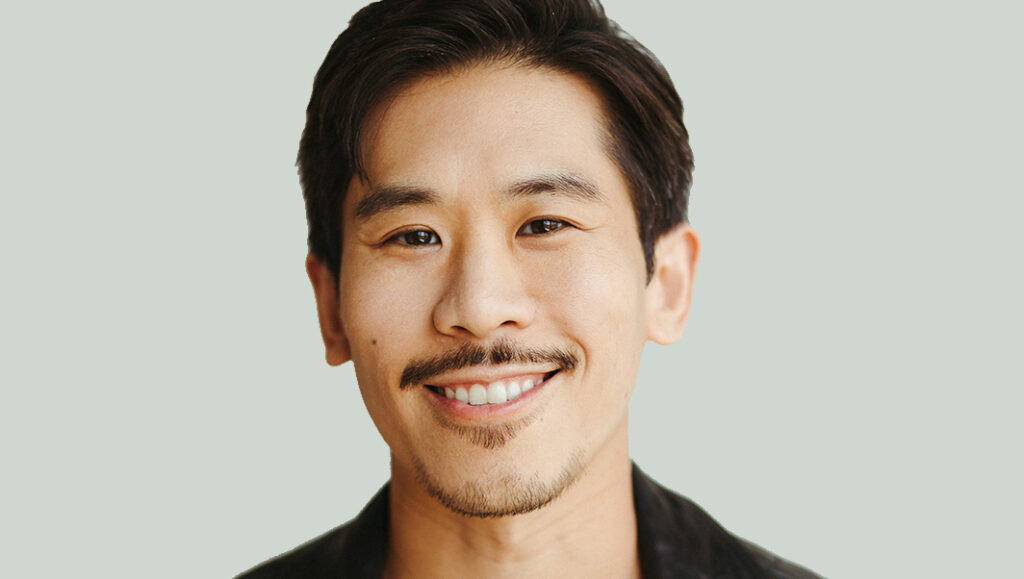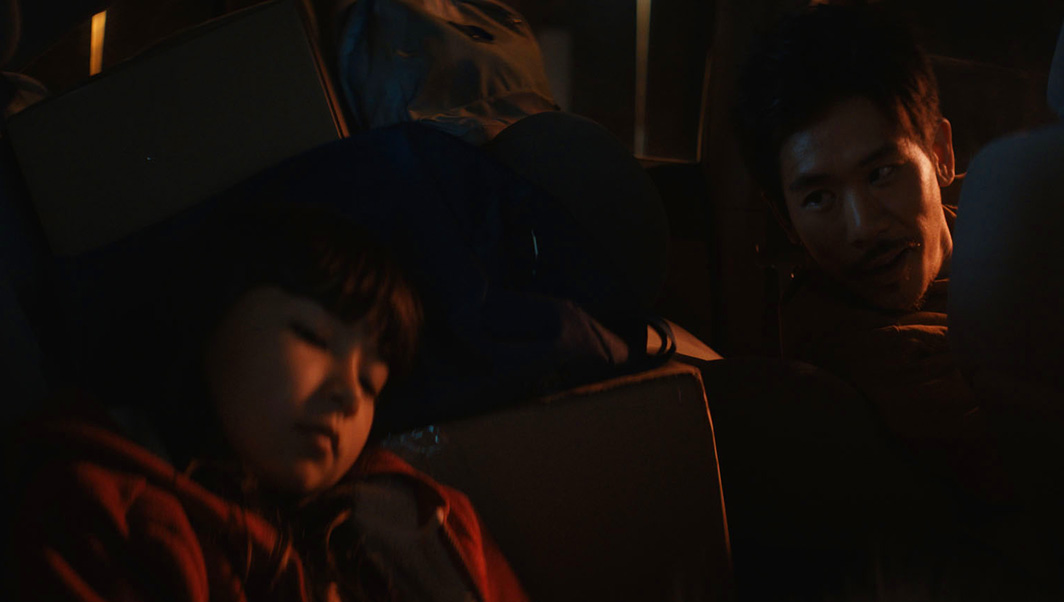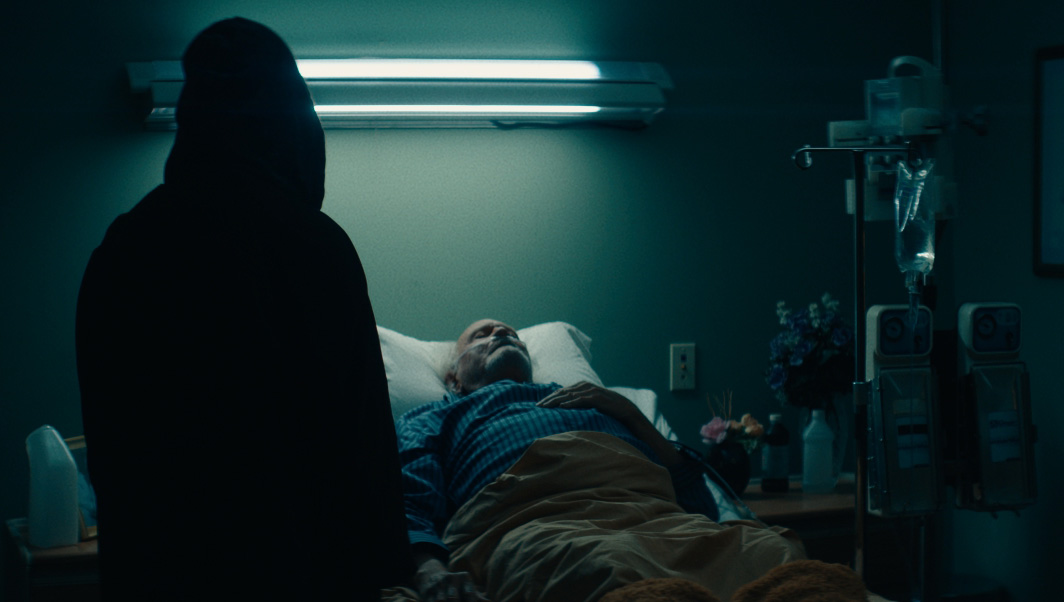Exclusive Interview: Lawrence Kao Talks ‘Ba,’ Playing a Father for the First Time, the Film’s Use of Genre, and its Universal Themes

Renowned for his enthralling performances on both stage and screen, Lawrence Kao has swiftly emerged as one of the industry’s most exhilarating and versatile young talents. With notable projects such as Walker: Independence, Wu Assassins, and The Originals, Lawrence’s talent lies in his remarkable ability to seamlessly embody characters, resonating deeply with audiences worldwide.
In his latest feature, Ba, Lawrence ventures into uncharted territory, portraying a father who makes the ultimate sacrifice for his young daughter. Daniel, driven by an unwavering desire to secure Colette’s future, unwittingly assumes a haunting role— that of Death itself. As he grapples with a chilling transformation, learning that everything he touches meets its end, Daniel adapts to his cursed existence, shielding himself and establishing strict boundaries to safeguard Colette. However, when a Child Protection Services Officer intervenes and uncovers Daniel’s truth, their world spirals into chaos.
Pop Culturalist recently caught up with Lawrence to chat about Ba, currently making waves on the festival circuit. We discussed his creative process stepping into the role of a father for the first time, his collaboration with writer-director Benjamin Wong, the film’s genre exploration, and its universal themes.
PC: As an actor, your job is to bring truth to your characters. When you’re playing somebody like Daniel, whose lived experiences are so different from your own, what is that prep process like, getting ready to step into his shoes?
Lawrence: To tap into that, you have to build the beliefs of the character. Whenever I’m acting, if I don’t believe it, then the audience won’t either. For this particular project, I’m not a father, and I was super apprehensive about doing it because I don’t have that life experience. But I just took the bewilderment of being a dad and how crazy that is and put it into this story. Every time I looked at Kai [Cech], I would think, “This is crazy. I’m a dad.” I utilized that shock factor and channeled it into this character.
I chatted with Ben a lot. Ben has two kids. His idea of what it means to be a dad is having a part of your heart ripped out and placed into somebody else. Every time I saw Kai, the actress who plays my daughter Collette, I used that as my base to push me forward.

PC: When we’ve spoken in the past, you talked about the sacrifices that your parents made for you to pursue your own passions and how they fostered that imagination, which feels very similar to Daniel and Collete, especially during that scene where he tells Child Protective Services that school wasn’t built for big imaginations. How much did you reference everything your parents have done for you as you embodied Daniel and his relationship with his daughter?
Lawrence: It’s interesting because it isn’t until you’re older that you realize all the sacrifices that your parents made so that you can do what you do today. For me, especially when I was working on this film, playing Daniel, and realizing the amount of sacrifices that I as Daniel had to make. You’re trying to understand whether or not that’s good enough. You try your best, and he’s going through all these crazy circumstances, and it still isn’t enough.
This project made me realize the amount of sacrifices that my parents have made so that I can be where I am today. I always look back on my past and think about how my parents did foster my imagination. Daniel is trying to do that for his daughter, despite all the hardships that he faces throughout the film.
PC: That’s also not the only moment in the film where it feels like you were able to bring a lot of your own self to this character, including a little shoutout that you gave to your friend Tony Tran. Were there other qualities of Daniel that you brought to him that initially weren’t on the page that helped you bridge your own connection with him? With Ben being the writer-director, how did that partnership and environment that he fostered allow you to push your performance and make bold, creative decisions?
Lawrence: It was already written in the script that Daniel’s a dancer. Putting the physicality of me as a dancer into the film was cool to incorporate. There are scenes that we took from footage that I experienced as a dancer post-college. After America’s Best Dance Crew, we were able to travel around and do a lot of dance performances. We were able to put some of those pieces into the movie as well. It was fun to shout out my friends that I danced with into the movie and put it into the script. It gave it this meta feel.
I was thinking about it recently, and I don’t want to give too much away about the movie, but he does have this injury. I was chatting with Ben about it, but it would have made the character more complex if that physical ailment still existed throughout the movie.
PC: This film doesn’t work unless audiences believe in that father-daughter relationship, and it really resonates off the screen. How were you and Kai able to build that dynamic while filming during a pandemic?
Lawrence: We reached a level of rapport so quickly, and it was just fun. Acting with someone at that age, you learn so much, even though I’ve been acting for a longer period of time. There’s this freshness in acting that children bring out. It’s funny because before they called action, we were just messing around. We were playing around and having these pure, father-daughter moments. Once they called action, we’d get into those serious scenes, but it was so easy working with Kai. It came super naturally. Every time I saw her, I got a glimpse of what it would be like to be a dad. It pushed me into the character. Another thing that helped propel me when I was looking at my daughter was seeing parts of my old partner in her. Also, filming this during the pandemic, the desire for me to be close to her but not being able to because of the circumstances in the story matched what was going on during filming during COVID.
PC: Life imitating art. Your portrayal of death is so nuanced, empathetic, and grounded, and it’s an interpretation that we don’t often see on screen. So much of that humanity is seen through his relationship with Sonny and the way that story unfolds. Michael [Paul Chan] has built such an illustrious tenure in this industry. What did you learn about your own craft from your collaboration working with him?
Lawrence: It was a lot of fun working with Michael. It was so easy. In the movie, my character sees him like a father figure and a mentor. He’s the only person that I can truly connect with because he can’t see the physical parts of who I embody. That being removed, it was easy for us to have that relationship in the story. He grounds me on my journey so I can continue to be the dad that I want to be. It was a lot of fun. He’s such a great actor. When you put two people together on screen and when it’s that easy, it creates really powerful scenes.

PC: You’ve also worked on projects of all sizes. What is it about independent filmmaking that excites you as a creative and storyteller?
Lawrence: Independent film is so fun because there’s so much collaboration involved in creating that magic. When stuff is made at the studio level, you don’t really have that much say. There isn’t a ton of room to voice your ideas. As an actor, I’m slowly continuing to learn how to do that in those types of environments.
But with an indie film, there are so many ups and downs. There are so many hiccups that can happen. But sometimes those hiccups are what create the magic in the final product. We utilize the things that are thrown against us like time crunches or having to shift certain things in order to elevate the story. There’s excitement in that. It’s got this underground guerrilla shooting style to it where things have to go quickly and everyone’s got to work together. We all have to be on the same page to make it happen.
PC: Being an Asian American creative in this industry, roles like this don’t come often. While it is Asian created and led, it’s also a universal story. As Ba continues to make its festival run, how do you hope this project could potentially open future doors for our community both in front of and behind the camera?
Lawrence: You’re right. This project is interesting because it is an Asian cast about an Asian family, but they don’t necessarily have to be Asian. We never even talk about that. It’s a father-daughter story where a father is in these crazy circumstances where he’s unable to be close to his daughter. It’s a universal story that anybody can find rapport with or can relate to.
Because of that, I think it can push Asian filmmakers to tell stories that don’t have to focus on being Asian or talking about Asian things. That’s not to say that that’s not necessary. It’s cool to talk about those things and about our culture, but it opens more doors and possibilities, especially within a story like this that uses genre to move the narrative forward. Hopefully, it can give other people more ideas to expand their imaginations.
PC: Speaking of that universality, the film is making its way around the festival circuit and it’s been screened in so many different markets. What has it been like getting to see the response it’s evoking in different countries?
Lawrence: It’s super cool to have it go to another country where the culture is entirely different from here and see them embrace the movie. It was in Brazil recently, and it was cool to see Portuguese subtitles and see people react positively to it.
It’s funny, too, because I don’t think people knew we were at the screening. I went to use the restroom, and when I came out, some guy came up to me and said, “The scariest part of today was seeing your personification of death walk into the bathroom.” [laughs] That was funny. Then another father came up to me and said that he really related to it because he’s a single dad. He was talking about the struggles of being a single dad and felt like the film really encapsulated those feelings and emotions.
PC: Outside of Ba, it was also recently announced that you’re going to be starring in In Fortune’s Shadow. Is there anything you can tell us about that project?
Lawrence: It’s a cool little action movie that we shot earlier this year in Arkansas. It stars Michael Rooker and Theo Rossi. It’s fun. I don’t want to spoil anything, but it has John Woo-esque vibes, a lot of gunfights, and a cool story.
That project was really full circle for me too because my first big TV thing was a co-star role on The Walking Dead, so I worked with Michael Rooker. Being able to work with him again brought everything full circle. Also, working with Leonard [Wu], who pretty much guided me at the beginning of my career when I first started doing TV and film, was incredible. I did a little short with him, and he helped guide me along the way. Now, I’m able to work with him again on this cool action film. It brings everything full circle. It should be out early next year.
To keep up with Lawrence, follow him on X and Instagram. Keep up with the latest news about Ba here.
Photo Credit: Erich Chen


Discussion about this post